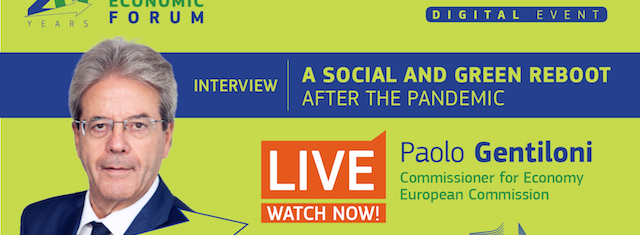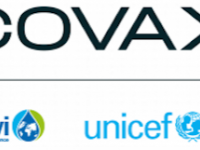Business
EUROGROUP COMMISSIONER GENTILONI IS FORECASTING AN 2% GROWTH ON AVERAGE
REMARKS AT EUROGROUP PRESS CONFERENCE

Paolo Gentiloni Eurogroup Commissioner (Source: euractiv)
USPA NEWS -
Eurogroup Commissioner Paolo Genitloni held a press conference on 15 February. We publish the full statement :
Good evening, I would add my words of warm welcome to the new ministers from Estonia and, of course, Italy.
We had an interesting start to the Eurogroup thanks to the initiative of the President to invite the World Health Organization to set the scene very effectively for our subsequent discussions. I found the explanation of the crucial work they are doing in terms of mapping new variants very interesting.. The colleagues from the WHO also underlined that nobody can be safe before everybody is safe and the importance of the very good cooperation with the European Commission, for instance on CoVax.
Good evening, I would add my words of warm welcome to the new ministers from Estonia and, of course, Italy.
We had an interesting start to the Eurogroup thanks to the initiative of the President to invite the World Health Organization to set the scene very effectively for our subsequent discussions. I found the explanation of the crucial work they are doing in terms of mapping new variants very interesting.. The colleagues from the WHO also underlined that nobody can be safe before everybody is safe and the importance of the very good cooperation with the European Commission, for instance on CoVax.
REMARKS BY COMMISSIONER GENTILONI AT THE EUROGROUP PRESS CONFERENCE ------------------------------Good evening, I would add my words of warm welcome to the new ministers from Estonia and, of course, Italy.
We had an interesting start to the Eurogroup thanks to the initiative of the President to invite the World Health Organization to set the scene very effectively for our subsequent discussions. I found the explanation of the crucial work they are doing in terms of mapping new variants very interesting.. The colleagues from the WHO also underlined that nobody can be safe before everybody is safe and the importance of the very good cooperation with the European Commission, for instance on CoVax.---------------------------------------------------------------------------------------------------------------------------------------------
Improving the public health situation is of course the first reason why we need to win the race that is underway between injections and infections. But, as you know, this is also an economic issue. A successful vaccination roll-out is also crucial for the economic recovery. As I explained to the Eurogroup today, the Winter Forecast we presented last week assumes that containment measures will ease ““ first gradually, towards the end of the second quarter, and then more markedly in the second half of this year. This assumes that the most vulnerable, and an increasing share of the adult population, will have been vaccinated by then.-------------------------------------------------------------------------------------------------------------------------
So we need to do, and we will do, everything possible to make that happen.
But what happens to our economy also depends on our decisions on the rollout of vaccines.-----------------------------------------
First, it is up to us, to make a success of NextGenerationEU. The impact of NextGenerationEU is not factored into our Winter Forecast. Our simulation projects that we should have growth of 2% on average and stronger than 2% in the most affected countries. Second, we will need to make wise choices in terms of fiscal policy, to avoid the premature withdrawal of supportive measures, as Paschal just said. We already decided last September that the General Escape Clause will remain activated throughout this year, so the question is, what about 2022? Member States will need guidance on this front, since they will soon start preparing their budgets for 2022 and medium-term fiscal planning------------------------------------------------
Ahead of this, in early March the Commission will provide guidance on how it intends to approach this year's spring economic policy package. This will include preliminary fiscal guidance for the period ahead and the parameters that we will look at to decide on the General Escape Clause.This will be our contribution to trigger the discussion Paschal was referring to. Of course, all of this is connected to the issue of corporate sector solvency, which we also discussed today. As Paschal said, taking stock, the initiatives we took were successful up until now in reducing the risk of bankruptcies and insolvencies. These risks were there. In the note we presented to ministers explains that, without accounting for government support measures or new borrowing, 23% of EU companies would have experienced liquidity distress by the end of 2020 after exhausting their working capital buffers. But the fraction of firms that are in liquidity distress after exhaustion of working capital buffers varies significantly between sectors, ranging from 8% of all firms in the manufacturing of computers and electronics, to 75% in the accommodation and food services sector.----------------------------------------------------------------------
So, thanks to public guarantee schemes, loan repayment moratoria and instruments such as SURE, these risks have remained low. We have to avoid a sharp rise in insolvencies in the future. It will be crucial to manage very carefully the withdrawal of public support measures.-------------------------------------------------------------------------------------------------------------------------
This means, first, moving gradually from a blanket approach to more targeted actions, with the distinction between companies we consider non-viable and companies we consider viable. This will not be easy.----------------------------------------
Second, facilitating a diversification of financing for viable firms and preserving an effective credit channel, especially for smaller companies. Third, for unviable firms, to organise an orderly exit, ensuring sound insolvency procedures.
In sum, we need to take the right decisions to decisively tackle the insolvency challenges of the corporate sector in the next months and years with the social implications of our decisions at the forefront of our minds. We are dealing with jobs, workers and people. Not abstract entities.-----------------------------------------------------------------------------------------------------
Lastly, a few words on strengthening the international role of the euro. This is not about currency competition. It is a contribution to a more stable and diversified global currency system and would also help to shield our economy from foreign exchange shocks. Several actions were discussed from the Communication of 19 January. Among the policy choices, let me underline a few of them.-------------------------------------------------------------------------------------------------------------------------
One is the importance of a successful issuance of euro-denominated bonds to finance NextGenerationEU. They will add significant depth and liquidity to the market ““ and the take-up of our SURE issuances bodes very well on this front.
Making the European financial system more resilient, by completing the Banking and Capital Markets Unions;
Secondly, strengthening cross-border payment systems, in relation to which our work with the ECB on digital finance is crucial. Lastly, but maybe mostly importantly, pursuing work on sustainable finance. Here the EU is already a global hub. We can strengthen our role. The commitment to have 30% of NextGenerationEU issuance on green bonds will strengthen this role." Paolo Gentiloni Eurogroup Commissioner said (Source: European Union)
European Union Covid-19 Eurogroup High Commissionner Paolo Genitloni Covax Pdt Ursula Von Der Lyen European Council Charles Michel David Sassoli Pdt European Parliament Rahma Sophia Rachdi Jedi Foster
Liability for this article lies with the author, who also holds the copyright. Editorial content from USPA may be quoted on other websites as long as the quote comprises no more than 5% of the entire text, is marked as such and the source is named (via hyperlink).







